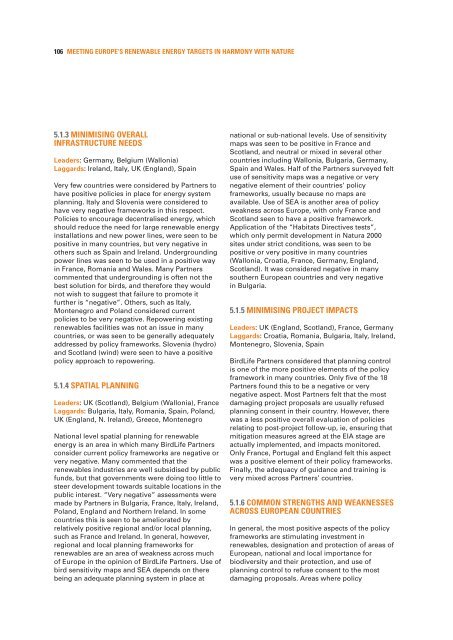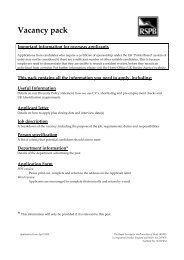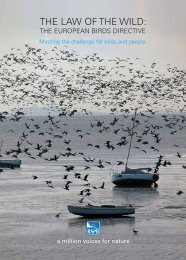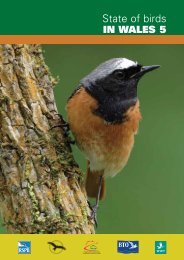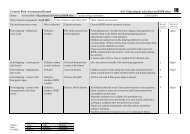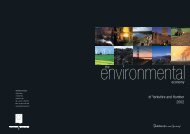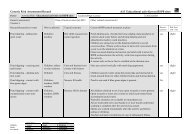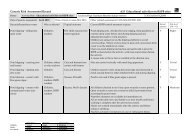Meeting Europe's renewable energy targets in harmony with - RSPB
Meeting Europe's renewable energy targets in harmony with - RSPB
Meeting Europe's renewable energy targets in harmony with - RSPB
Create successful ePaper yourself
Turn your PDF publications into a flip-book with our unique Google optimized e-Paper software.
106 MEETING EUROPE’S RENEWABLE ENERGY TARGETS IN HARMONY WITH NATURE<br />
5.1.3 MINIMISING OVERALL<br />
INFRASTRUCTURE NEEDS<br />
Leaders: Germany, Belgium (Wallonia)<br />
Laggards: Ireland, Italy, UK (England), Spa<strong>in</strong><br />
Very few countries were considered by Partners to<br />
have positive policies <strong>in</strong> place for <strong>energy</strong> system<br />
plann<strong>in</strong>g. Italy and Slovenia were considered to<br />
have very negative frameworks <strong>in</strong> this respect.<br />
Policies to encourage decentralised <strong>energy</strong>, which<br />
should reduce the need for large <strong>renewable</strong> <strong>energy</strong><br />
<strong>in</strong>stallations and new power l<strong>in</strong>es, were seen to be<br />
positive <strong>in</strong> many countries, but very negative <strong>in</strong><br />
others such as Spa<strong>in</strong> and Ireland. Underground<strong>in</strong>g<br />
power l<strong>in</strong>es was seen to be used <strong>in</strong> a positive way<br />
<strong>in</strong> France, Romania and Wales. Many Partners<br />
commented that underground<strong>in</strong>g is often not the<br />
best solution for birds, and therefore they would<br />
not wish to suggest that failure to promote it<br />
further is “negative”. Others, such as Italy,<br />
Montenegro and Poland considered current<br />
policies to be very negative. Repower<strong>in</strong>g exist<strong>in</strong>g<br />
<strong>renewable</strong>s facilities was not an issue <strong>in</strong> many<br />
countries, or was seen to be generally adequately<br />
addressed by policy frameworks. Slovenia (hydro)<br />
and Scotland (w<strong>in</strong>d) were seen to have a positive<br />
policy approach to repower<strong>in</strong>g.<br />
5.1.4 SPATIAL PLANNING<br />
Leaders: UK (Scotland), Belgium (Wallonia), France<br />
Laggards: Bulgaria, Italy, Romania, Spa<strong>in</strong>, Poland,<br />
UK (England, N. Ireland), Greece, Montenegro<br />
National level spatial plann<strong>in</strong>g for <strong>renewable</strong><br />
<strong>energy</strong> is an area <strong>in</strong> which many BirdLife Partners<br />
consider current policy frameworks are negative or<br />
very negative. Many commented that the<br />
<strong>renewable</strong>s <strong>in</strong>dustries are well subsidised by public<br />
funds, but that governments were do<strong>in</strong>g too little to<br />
steer development towards suitable locations <strong>in</strong> the<br />
public <strong>in</strong>terest. “Very negative” assessments were<br />
made by Partners <strong>in</strong> Bulgaria, France, Italy, Ireland,<br />
Poland, England and Northern Ireland. In some<br />
countries this is seen to be ameliorated by<br />
relatively positive regional and/or local plann<strong>in</strong>g,<br />
such as France and Ireland. In general, however,<br />
regional and local plann<strong>in</strong>g frameworks for<br />
<strong>renewable</strong>s are an area of weakness across much<br />
of Europe <strong>in</strong> the op<strong>in</strong>ion of BirdLife Partners. Use of<br />
bird sensitivity maps and SEA depends on there<br />
be<strong>in</strong>g an adequate plann<strong>in</strong>g system <strong>in</strong> place at<br />
national or sub-national levels. Use of sensitivity<br />
maps was seen to be positive <strong>in</strong> France and<br />
Scotland, and neutral or mixed <strong>in</strong> several other<br />
countries <strong>in</strong>clud<strong>in</strong>g Wallonia, Bulgaria, Germany,<br />
Spa<strong>in</strong> and Wales. Half of the Partners surveyed felt<br />
use of sensitivity maps was a negative or very<br />
negative element of their countries’ policy<br />
frameworks, usually because no maps are<br />
available. Use of SEA is another area of policy<br />
weakness across Europe, <strong>with</strong> only France and<br />
Scotland seen to have a positive framework.<br />
Application of the “Habitats Directives tests”,<br />
which only permit development <strong>in</strong> Natura 2000<br />
sites under strict conditions, was seen to be<br />
positive or very positive <strong>in</strong> many countries<br />
(Wallonia, Croatia, France, Germany, England,<br />
Scotland). It was considered negative <strong>in</strong> many<br />
southern European countries and very negative<br />
<strong>in</strong> Bulgaria.<br />
5.1.5 MINIMISING PROJECT IMPACTS<br />
Leaders: UK (England, Scotland), France, Germany<br />
Laggards: Croatia, Romania, Bulgaria, Italy, Ireland,<br />
Montenegro, Slovenia, Spa<strong>in</strong><br />
BirdLife Partners considered that plann<strong>in</strong>g control<br />
is one of the more positive elements of the policy<br />
framework <strong>in</strong> many countries. Only five of the 18<br />
Partners found this to be a negative or very<br />
negative aspect. Most Partners felt that the most<br />
damag<strong>in</strong>g project proposals are usually refused<br />
plann<strong>in</strong>g consent <strong>in</strong> their country. However, there<br />
was a less positive overall evaluation of policies<br />
relat<strong>in</strong>g to post-project follow-up, ie, ensur<strong>in</strong>g that<br />
mitigation measures agreed at the EIA stage are<br />
actually implemented, and impacts monitored.<br />
Only France, Portugal and England felt this aspect<br />
was a positive element of their policy frameworks.<br />
F<strong>in</strong>ally, the adequacy of guidance and tra<strong>in</strong><strong>in</strong>g is<br />
very mixed across Partners’ countries.<br />
5.1.6 COMMON STRENGTHS AND WEAKNESSES<br />
ACROSS EUROPEAN COUNTRIES<br />
In general, the most positive aspects of the policy<br />
frameworks are stimulat<strong>in</strong>g <strong>in</strong>vestment <strong>in</strong><br />
<strong>renewable</strong>s, designation and protection of areas of<br />
European, national and local importance for<br />
biodiversity and their protection, and use of<br />
plann<strong>in</strong>g control to refuse consent to the most<br />
damag<strong>in</strong>g proposals. Areas where policy


